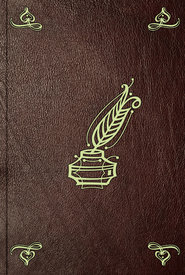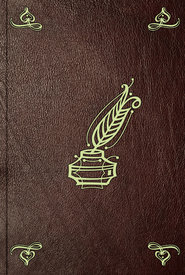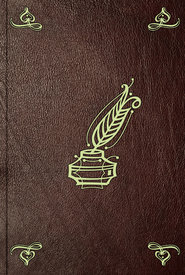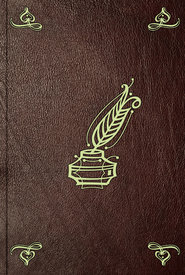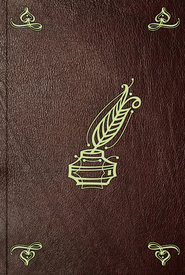По всем вопросам обращайтесь на: info@litportal.ru
(©) 2003-2024.
✖
Stories from the Faerie Queen, Told to the Children
Настройки чтения
Размер шрифта
Высота строк
Поля
The spreading branches of the trees were overgrown with grey moss, and their green leaves were never still, but whispered and trembled as if the wind was blowing on them. George thought he would make a garland of these fresh leaves to put on Fidessa’s dark hair. He plucked a little branch, and, as he broke it, red drops of blood trickled down from the place where it was broken.
Then a sad voice spoke out of the tree, and told him that the trees were not really trees, but a knight and a lady, who had been bewitched by the magic of a wicked witch.
The witch who had done it was Fidessa, and when Fidessa heard the tree speak, she was afraid that George would find her out. But George was too simple and too true to think that beautiful Fidessa could be so wicked. He was very sorry for having hurt the tree-man, and with some earth plastered up the place that bled.
Then he and Fidessa hurried away from the place of the shivering trees.
When they had ridden for a long time they came to a gorgeous palace where only bad people stayed. Fidessa made George come with her into the palace, and while they stayed there she got some of the wicked knights of the palace to fight with George and try to kill him. But George was braver and stronger than any of these knights, and instead of their killing him, he killed them.
One day Fidessa went from home, and, while she was away, Una’s dwarf, who had never left George, went wandering through the palace.
In a dark and horrible dungeon he found many knights, and kings, and ladies and princes shut up as prisoners.
The dwarf ran and told George, and the Red Cross Knight, fearing that he also would be made a prisoner and cast into the dungeon if he stayed longer in the enchanted palace, rode away. The wounds he had got in his last fight were still unhealed, so that he could not go fast.
When Fidessa got back and found him gone, she rode after him as fast as ever she could.
When she found him he was resting, with his armour off, on the mossy grass by the side of a sparkling fountain. He was peacefully listening to the sweet song of birds, and to the tinkling water, when Fidessa’s red robes showed through the trees.
She talked to him so cunningly that soon she persuaded him to think that she loved him very much and meant him nothing but kindness.
Now the witch knew that the water of the fountain was magic water, and if any one drank it all his strength would leave him. So she made George lie down on the sandy gravel and drink. In one minute his strength all went from him and he was no stronger than a tiny boy.
No sooner had this happened than there walked out from amongst the trees an enormous ugly giant. In his hand, for a club, he carried a big oak-tree that he had pulled out of the earth by the roots. When he saw George he rushed at him like an earthquake, and smote him such a mighty blow that George fell fainting to the ground. Then the giant picked him up as if he had been a helpless little baby, and carried him away, and threw him into the darkest dungeon of his castle in the woods.
Una’s dwarf, who had hidden in the bushes and seen all that happened, ran away, lest the giant should kill him.
But Fidessa, the wicked witch, made friends with the giant, and he made her his wife.
He gave her a robe of purple and gold to wear, and put a splendid gold crown on her head. And to make people more afraid of her than they were already, he gave her a horrible beast with seven heads and a long scaly tail of brass to ride on.
For months and months George was a prisoner in the gloomy dungeon. The light never came into it, nor any air. He was chained with heavy iron bands, and was given scarcely anything to eat or to drink. His face grew white and thin, and his eyes grew hollow. His strong arms became only skin and bone, and his legs were so feeble that he could not stand. He looked more like a shadow than a man.
One day, as he lay on the floor of the dungeon, feebly moaning and longing to die, the door burst open.
A knight in shining armour of diamonds and gold stood before him, and before George could speak to him, there ran into the dreary cell, like a sunbeam in the dark, his own beautiful Una.
Una nearly cried for joy at seeing her knight again, and for sorrow because he looked so terribly ill.
She told him that Prince Arthur, the knight who had saved him, had cut off the giant’s head, and slain the seven-headed monster, and made Fidessa prisoner.
Then Prince Arthur tore off Fidessa’s robe of purple and gold, and her golden crown and all her sparkling jewels. And all her beauty faded away, and she looked like the hideous, wicked old witch that she really was.
George shrank away from her in horror, and wondered how she could ever have made him forget Una, or have made him think that she herself was good and beautiful.
And Fidessa, frightened at being found out, ran away and hid herself in a dark cave in the lonely desert.
Then Una took George, who was now no stronger than a little child who has been ill, to an old house not far away from the giant’s castle. It was called the House of Holiness.
There lived there a good old lady and her three good and beautiful daughters, and they helped Una to nurse George until he grew strong again.
And as he grew stronger, from the rest and their care and the dainty food they gave him, those ladies of the House of Holiness taught the young knight many things.
He learned to be more gentle than he had been before, and never to be proud nor boastful, and to love nothing that was not wholly good. He learned, too, not to hate any one, nor to be angry or revengeful, and always to be as generous and as merciful as he was brave.
When he was quite strong once more, he went from the House of Holiness to a place where an old hermit stayed, and from him George learned still more of what was good.
George had always thought that he was a fairy’s son, but the hermit told him the story of how the bad fairy had stolen him from his father’s castle when he was a baby. And although George loved his Faerie Queen and the fairy knights and ladies, he was glad to think that he was the son of an English king.
The old man told him that if, all through his life, he was true, and brave, and merciful and good, one day he should be called a saint. And he would be the saint who belonged especially to all Englishmen and Englishwomen, and to English boys and girls.
‘Saint George shalt thou callèd be,
Saint George of Merry England, the sign of victory.’
Then did George, his shining armour with its red crosses, and his sharp sword and glittering spear buckled on again, ride away once more with Una, to kill the dragon and set free the king and queen.
It was a dreary country that they rode through, for the dragon had laid it all waste, but from far away they saw the tower of brass shining in the sun.
As they drew nearer they saw a watchman on the top of the tower gazing across the plain. Day after day for a long, long time he had looked for Una to come back with a knight to slay the dragon. When he saw Una and George crossing the plain, he ran and told the king and queen, and the old king climbed up to the top of the tower to see for himself that the good news was true.
As they drew near the tower, George and Una heard a hideous roaring sound. It filled all the air and shook the ground like an earthquake. It came from the dragon, that was stretched out in the sun on the side of a hill.
When it saw the knight in gleaming armour riding towards it, it roused itself joyfully up to come and kill him, as it had killed all the other knights.
George made Una go to a high piece of ground, from whence she could see the fight, and where she would be out of danger, and then rode to meet the terrible beast.
Half running and half flying, with its great ugly wings, the dragon came swiftly towards him. It was so big that its shadow looked like the dark shadow of a mountain on a valley. Its body was monstrous and horrible and vast, and was all swelled out with rage. It had scales all over it that shone like brass, and that were as strong as steel. Its wings were like big sails, and when it flapped them and clashed its scales, the sound was like the sound of a great army fighting. Its long tail was spotted red and black, and at the end of it two sharp stings stuck out. It had cruel long claws, and its gaping jaws had each three rows of iron teeth, all stained and wet with the blood of the people it had eaten last. It had eyes like flames, and its breath was fire and smoke.
When it rushed at George, George rode hard at it with his spear. But no spear was ever made that was strong enough to pierce that dragon’s scales. The spear glanced off from its ugly, speckled breast, but the dragon, furious at the hard thrust that George had given him, lashed out with its tail so furiously that both the horse and his rider were thrown to the ground. Lightly they rose up again, and again George smote with his spear.
Then the dragon, spreading its wings, rose from the ground like a giant bird, and seizing George and his horse in its claws, flew away with them. Right across the plain it flew, then, finding them heavy, it dropped them on the ground. As it did this, George thrust with his spear under the dragon’s stretched-out wing, and made a great gaping wound. The spear broke, but the spear-head stuck in the wound, until the dragon, mad with rage and pain, plucked it out with its teeth.
Then did fire and smoke rush out more terribly than before from the jaws of the furious dragon. It lashed its long tail so savagely that it folded in its coils George’s foaming horse. The frantic horse, in its struggles to get free, threw George on the ground amongst the horrible blood. But George sprang to his feet, and with his sharp sword struck again and again at the dragon’s head. The sword could not pierce it, but the dragon, annoyed at George’s fierce attack, thought it would fly out of his reach. But when it tried, the wound George had made in its wing prevented it.
Then its rage at George grew fifty times more furious. It roared till the whole land shook, and it sent out from its inside such blazing flames that George’s face was scorched and his armour grew so hot that it burned into his flesh.
George was so tired and so faint and sore, that when he was burned as well, he feared that the end had come. The dragon saw his faintness, and smiting him a tremendous blow with its great tail, it threw him down, and George fell backwards into a pool of water. Now this pool of water was a magic spring. When George fell into it, all his faintness and weariness vanished.
Una, who feared he was dead, saw him spring out of the water even fresher and stronger than he had been at the beginning of the fight.
The dragon could not believe its eyes, and thought that George must be a new knight who had come to fight it.
Before it had got over its surprise, George struck its head so fiercely with his sword, which still dripped from the magic water, that he made a great wound.
The dragon, roaring like a hundred lions, struck at George with the stings on the end of its tail. One of them went right through George’s shield, and through his armour, and firmly stuck in his shoulder. Though George was faint with the pain it caused, he hit the dragon’s tail such a blow that he hewed off five joints and left only the ugly stump.
Mad with rage, the dragon, belching out smoke and fire, and giving fearful cries, seized George’s silver shield in its claws and tried to drag it from him. Again and again, and yet again, George struck at it with his sword. At last he hit the joint and cut the paw clean off. Even then, so tight was the grip that the claws had got, that it still hung bleeding from the shield.







